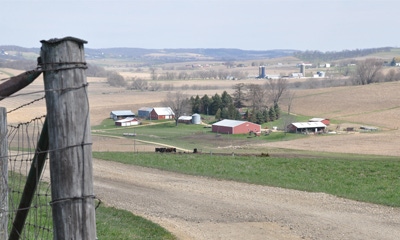September 4, 2017

The title of this article may lead some readers to think I’m advocating “tying up the land for future generations” or “generation-skipping.” I’m not.
Let’s talk about tying up the land for future generations, and why that’s not what I am advising. Some farmers have been told that the way to keep the land in the family through multiple generations is to give children only a life estate, and grandchildren ownership of the property. A life estate essentially means the income from the property for life, while the ultimate ownership of the land is the later generation’s.
The motives behind this have a kernel of truth: Since children won’t own the property, two main things are seemingly achieved. One, someone who could otherwise take it from them, can’t. Think in-law turned outlaw, or unexpected creditors (i.e., accident and lawsuit). Two, the land won’t be included in the child’s taxable estate when they die.
Good intentions, perhaps, but at what cost?
How it plays out
Consider Tom. He leaves farmland to his six grandchildren; his two children receive income for life. The first unintended problem occurs immediately upon Tom’s death. If his farm is worth more than the federal estate tax limit of $5.49 million, the excess will be subject to a double estate tax. By leaving assets in a way that keeps them out of his children’s estates, Tom triggers the “generation-skipping transfer tax” — roughly another 24% on top of the ordinary 40% estate tax.
Even if Tom’s estate isn’t big enough to be taxed, he creates other problems. Imagine being Tom’s child. If you don’t control the future of the land given to you, are you as likely to improve it or even care for it? You don’t have any natural incentive to do so. Did Tom think of this unintended consequence?
There’s also the issue of collateral. Can you use land you don’t own as collateral? Pledge it to help you buy the adjoining 80 acres? No.
Next, Tom thought that leaving only a life estate to the two kids would protect the property from lawsuits. It might do that for his children, but from the date of his death, the land ownership is exposed to any lawsuit against any of his six grandchildren. Tom tripled the farm’s risk exposure!
Further, when Tom says, “As of my death, my children get a life estate only, and my property is given to my grandchildren,” he must be assuming that when his children die in about 25 years that all of the grandchildren will be perfect. None will be alcoholics or on drugs. None will have creditor problems. None will get divorced. None will spend through their assets in a nursing home. About 25 years after his death, however, his grandchildren will be scattered around the country, some of them with little or no interest in farming. Any one of them will be able to force the sale of the farm, to “finally cash in” on their inheritance. Has Tom thought this through?
Finally, Tom is saying, “As of my death, I know the future state of my grandchildren better than my own children will when they plan for their own deaths.” So he, not his children, decides how best to leave family assets to their children. Do his children deserve such disregard?
The better alternative
Now back to the title: Too often, farmers seem to think that you must either, one, give your children the land outright, or, two, tie things up so the children have no control. There are better alternatives: Leave assets in trust, with your objectives clearly included.
Why a trust? A trust is the most flexible legal tool available to you for directing and protecting the future of the farm. If you want to protect the assets from heirs’ lawsuits, divorces and nursing home expenses, you can. If you want to keep the property out of your children’s taxable estates, you can. If you want to say the children can’t sell the farmland, you can. If you trust them to use their inherited property as collateral, you can. If you think your children can make good judgments about the best way to leave the property to their children, the trust can give them that privilege.
Multigenerational mindset? Your child is better off receiving the farm in a flexible trust than receiving it outright.
Ferguson owns The Estate Planning Center in Salem. Learn more at thefarmersestateplanningattorneys.com.
About the Author(s)
You May Also Like






